WELCOME TO THE ARCHIVE (1994-2014) OF THE MAQUILA SOLIDARITY NETWORK. For current information on our ongoing work on the living wage, women's labour rights, freedom of association, corporate accountability and Bangladesh fire and safety, please visit our new website, launched in October, 2015: www.maquilasolidarity.org
 Over the last decade the garment industry in and around Tehuacan has gone through a dramatic transition. The combined effects of a variety of factors, including the 2009 global economic crisis, have severely weakened Tehucan's garment industry and made more precarious the living and working conditions in which workers and their families find themselves. In 2010, Rodrigo Santiago Hernandez produced an update to a 2003 report he worked on with MSN and the Human and Labour Rights Commission of Tehuacan on worker rights in the garment industry in Tehuacan. MSN has produced a summary and analysis of his research findings, now available for download.
Over the last decade the garment industry in and around Tehuacan has gone through a dramatic transition. The combined effects of a variety of factors, including the 2009 global economic crisis, have severely weakened Tehucan's garment industry and made more precarious the living and working conditions in which workers and their families find themselves. In 2010, Rodrigo Santiago Hernandez produced an update to a 2003 report he worked on with MSN and the Human and Labour Rights Commission of Tehuacan on worker rights in the garment industry in Tehuacan. MSN has produced a summary and analysis of his research findings, now available for download.
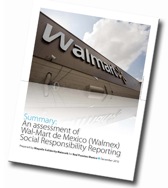 A new report by MSN and Red Puentes Mexico examining Wal-Mart Mexico's (Walmex) CSR reporting, finds weaknesses in the company's reporting and practices, particularly in the areas of labour rights and the environment. "Walmex needs to better address underlying policy issues such as the presence of protection contracts in most of its retail outlets, its treatment of over 23,000 "volunteer" youth baggers and the lack of consultation with civil society stakeholders on social and environmental issues," says Beatriz Lujan, of the Authentic Labour Front, a member organization of Red Puentes Mexico.
A new report by MSN and Red Puentes Mexico examining Wal-Mart Mexico's (Walmex) CSR reporting, finds weaknesses in the company's reporting and practices, particularly in the areas of labour rights and the environment. "Walmex needs to better address underlying policy issues such as the presence of protection contracts in most of its retail outlets, its treatment of over 23,000 "volunteer" youth baggers and the lack of consultation with civil society stakeholders on social and environmental issues," says Beatriz Lujan, of the Authentic Labour Front, a member organization of Red Puentes Mexico.
 The global financial crisis now underway is expected to have major consequences for workers in the global South who depend on North American and European markets.
The global financial crisis now underway is expected to have major consequences for workers in the global South who depend on North American and European markets.
This paper takes a look at the possible impacts of the financial crisis on the garment industry and garment workers. It goes on to lay out indicators to look for that help gauge the impact that workers will ultimately feel.
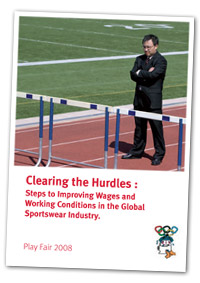
As the clock ticks down to the Beijing Olympics, international sportswear companies are amassing huge profits and arranging multi-million dollar sponsorship deals with the Games, Olympic athletes and national teams.
Meanwhile, workers producing their goods are still living in poverty. In a new report, “Clearing the Hurdles: Steps to improving working conditions in the global sportswear industry”, Play Fair 2008 calls upon brands, manufacturers, and multi-stakeholder initiatives to overcome four major hurdles to make real, measurable progress on wages and working conditions in the global sportswear industry.
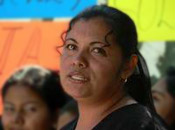
Estela Ramirez, ex-Hermosa worker
Credit: Christliche Initiative Romero
A new report prepared by the Maquila Solidarity Network for the Fair Labor Association (FLA) documents the desperate situation of former employees of the Hermosa Manufacturing facility in El Salvador, which closed in May 2005, leaving former Hermosa workers without jobs, back wages, severance pay, health insurance and employee pensions. MSN's report identifies next steps to rectify the injustices suffered by the Hermosa workers, and actions that buyers can take to prevent future "Hermosas".
(March 2007) Although price remains the main factor in sourcing decisions, brands are also concerned with guaranteeing that their products reach stores at the right time. According to brand representatives, instability in different countries also motivates brands to keep work in different countries located in different regions. For brands selling in the US market, it is quite likely that their strategies first divide suppliers into two big categories: Asia/Americas.
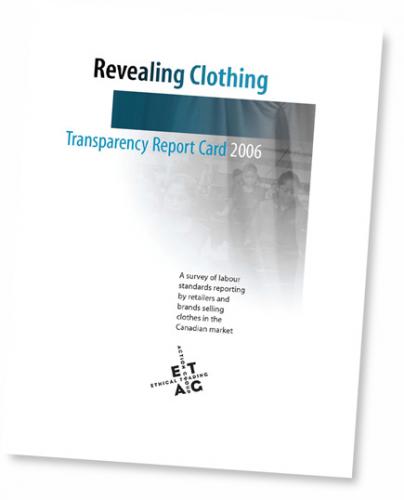 December 2006
December 2006
The Ethical Trading Action Group's (ETAG's) 2006 Transparency Report Card shows that companies are opening up on labour standards, but tackling labour rights abuses requires more worker involvement.
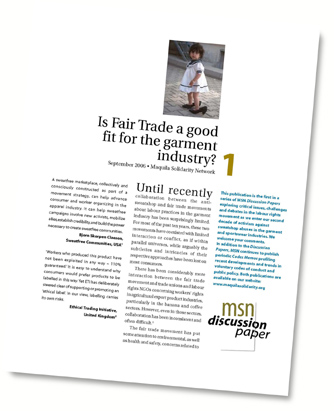 Can a ‘fair trade' apparel brand expand the fight for worker rights or would it reduce the pressure on mainstream apparel companies to change their labour practices? Would fair trade apparel brands finally give consumers an effective way to "vote with their dollars" or could they actually confuse and demobilize consumers? And what will it mean for worker organizing in the apparel industry?
Can a ‘fair trade' apparel brand expand the fight for worker rights or would it reduce the pressure on mainstream apparel companies to change their labour practices? Would fair trade apparel brands finally give consumers an effective way to "vote with their dollars" or could they actually confuse and demobilize consumers? And what will it mean for worker organizing in the apparel industry?
Download the Discussion Paper here (PDF format, 500k)
Coming Clean on the Clothes We Wear assesses and compares 25 retailers and brands based on the information they provide to the public on their efforts to address labour rights issues in their global supply chains.
A simple guide for public institutions and campaigners on how to effectively implement No Sweat policies. PDF format